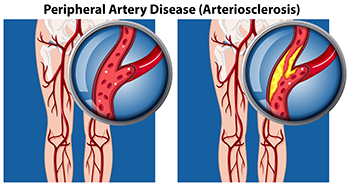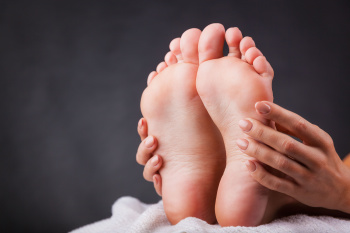
Peripheral artery disease, or PAD, which reduces blood flow to the feet due to narrowed arteries, is often caused by fatty deposits known as atherosclerosis. When circulation to the lower limbs is restricted, people may experience cold feet, skin color changes, slow-healing wounds, or painful cramping while walking. Over time, symptoms of peripheral artery disease can progress and may lead to serious complications, including ulcers or tissue damage. Hair loss on the feet and slow-growing toenails are other indications of poor circulation. People with diabetes, high blood pressure, or a history of smoking are at a higher risk of developing PAD. A podiatrist may detect reduced pulses, temperature differences, or other signs during a foot exam and can recommend diagnostic testing, such as an ankle-brachial index. If PAD is identified early, a podiatrist may suggest medical treatment, and, in severe cases, surgery to restore blood flow and prevent further damage. If you are experiencing symptoms of peripheral artery disease, it is suggested that you schedule an appointment with a podiatrist for appropriate treatment options.
Peripheral artery disease can pose a serious risk to your health. It can increase the risk of stroke and heart attack. If you have symptoms of peripheral artery disease, consult with Brent Harwood, DPM from Southeast Podiatry. Our doctor will assess your condition and provide you with quality foot and ankle treatment.
Peripheral artery disease (PAD) is when arteries are constricted due to plaque (fatty deposits) build-up. This results in less blood flow to the legs and other extremities. The main cause of PAD is atherosclerosis, in which plaque builds up in the arteries.
Symptoms
Symptoms of PAD include:
It is important to note that a majority of individuals never show any symptoms of PAD.
Diagnosis
While PAD occurs in the legs and arteries, Podiatrists can diagnose PAD. Podiatrists utilize a test called an ankle-brachial index (ABI). An ABI test compares blood pressure in your arm to you ankle to see if any abnormality occurs. Ultrasound and imaging devices may also be used.
Treatment
Fortunately, lifestyle changes such as maintaining a healthy diet, exercising, managing cholesterol and blood sugar levels, and quitting smoking, can all treat PAD. Medications that prevent clots from occurring can be prescribed. Finally, in some cases, surgery may be recommended.
If you have any questions, please feel free to contact one of our offices located in Fairhope and Atmore, AL . We offer the newest diagnostic and treatment technologies for all your foot care needs.

Caring for your feet is essential to maintaining overall health and comfort. Washing your feet daily with warm water and drying them thoroughly, especially between the toes, helps prevent infections. Alternating shoes gives them time to air out and reduces moisture buildup. Avoiding flip flops for long periods helps prevent strain, while choosing supportive shoes protects the arches and joints. Checking your feet each day for cuts, blisters, or other changes is important, especially for anyone with diabetes or circulation issues. A podiatrist can provide expert advice on proper foot care, recommend the best footwear for your needs, and treat any issues early. If you have foot pain, it is suggested that you consult a podiatrist who can treat various foot conditions, and guide you on important foot care tips.
Everyday foot care is very important to prevent infection and other foot ailments. If you need your feet checked, contact Brent Harwood, DPM from Southeast Podiatry. Our doctor can provide the care you need to keep you pain-free and on your feet.
Everyday Foot Care
Often, people take care of their bodies, face and hair more so than they do for their feet. But the feet are a very important aspect of our bodies, and one that we should pay more attention to. Without our feet, we would not be able to perform most daily tasks.
It is best to check your feet regularly to make sure there are no new bruises or cuts that you may not have noticed before. For dry feet, moisturizer can easily be a remedy and can be applied as often as necessary to the affected areas. Wearing shoes that fit well can also help you maintain good foot health, as well as making it easier to walk and do daily activities without the stress or pain of ill-fitting shoes, high heels, or even flip flops. Wearing clean socks with closed shoes is important to ensure that sweat and bacteria do not accumulate within the shoe. Clean socks help to prevent Athlete’s foot, fungi problems, bad odors, and can absorb sweat.
If you have any questions please feel free to contact one of our offices located in Fairhope and Atmore, AL . We offer the newest diagnostic and treatment technologies for all your foot and ankle needs.